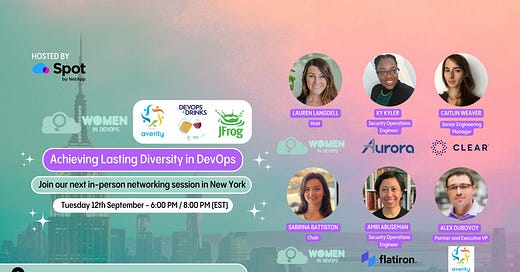Why is Diversity so Important?
Diversity is the range of human differences, the existence of variations of different characteristics in a group of people. Why is this so important in the workplace? What are the real benefits?
Why is diversity so important? Averity was recently a core sponsor and key speaker for the Women in DevOps meetup in New York. As Lauren Langdell eloquently put it, “In New York City, we hosted our own meet-up with JFrog, which was our first event in NYC! We had an amazing panel Ky K., Amri Abuseman, Caitlin Weaver & Alex Dubovoy, where we discussed belonging in DevOps, and we were blown away by the audience participation and feedback. It was clear that there is a strong desire for more inclusive and equitable tech workplaces, and we are committed to leading the way in making this happen.”
Diversity in the workplace is essential for numerous reasons, and it has become a key focus for businesses and organizations worldwide. But why?
There are several topics around creating and optimizing a diverse work space and Averity has queued them up. Look out for the following newsletters from THE DOWNLOAD on the difference between EEO and D&I and how to build a diverse workplace.
Diversity can be defined as a varied set of things or people that make up a whole. It is in the multiplicity that we find opportunities for learning and practicing different skills: empathy, emotional intelligence, and understanding. The importance of diversity is intrinsic to our daily lives.
Here are some of the key reasons why diversity is critical in the workplace:
Innovation and Creativity: Diverse teams bring together people with different backgrounds, perspectives, and experiences. This diversity of thought leads to more innovative ideas and creative solutions to problems. Different viewpoints can spark new approaches and strategies.
Enhanced Customer Understanding: A diverse workforce can better understand and serve a diverse customer base. This can lead to improved customer satisfaction, increased sales, and a stronger market presence.
Global Market Access: In today's interconnected world, diversity in the workplace can help businesses expand into global markets. Having employees who understand different cultures, languages, and markets is a significant advantage.
Improved Problem Solving: Diversity promotes a broader range of problem-solving approaches. When a team includes people from various backgrounds, they can draw on their unique experiences and insights to address complex issues more effectively.
Better Decision-Making: Diverse teams tend to make better decisions. When individuals with varied backgrounds and perspectives collaborate, they are more likely to consider a wider range of factors and make well-rounded choices.
Adaptability and Resilience: Diverse teams are often more adaptable and resilient in the face of change and uncertainty. They can draw on a broader range of experiences to navigate challenges
Attracting Top Talent: Companies prioritizing diversity are more appealing to a broader pool of job seekers. This can help attract top talent from various demographics, ensuring a competitive advantage in the recruitment process.
Company Culture: Promoting diversity fosters a more inclusive workplace culture where all employees feel welcome, valued, and respected. This, in turn, can contribute to a positive and productive work environment.
Diversity in the workplace has been shown to have a significant positive impact on creativity, innovation, decision-making, and overall business success. Embracing diversity and fostering an inclusive environment is an investment that pays off in numerous ways.
Look out for the following newsletters from THE DOWNLOAD on the difference between EEO and D&I and how to build a diverse workplace. All part of The Averity Experience!




